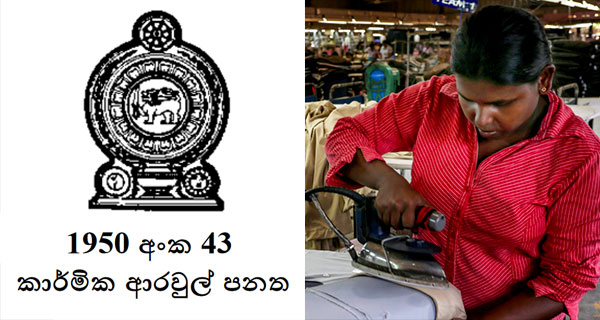The Ministry of Labor has decided to amend the Industrial Disputes Act expeditiously.
The Industrial Division of the Ministry of Labor has introduced various Acts to maintain a good employer-employee relationship in the country. Among them is the Industrial Disputes Act No. 43 of 1950. It is under this Act that the service of any employee in the private sector is terminated.
But the bill has not yet been subject to any compromise. The Ceylon Chamber of Commerce and Industry had stated as follows.
The Act is a precursor to the prevention, investigation and resolution of industrial disputes. Although the so-called “termination” of industry disputes is the preamble, the mechanism under the Act has no consensus to prevent an industrial dispute. The arbitration mechanism mentioned in the Act is the procedure to be followed after an industry dispute arises, such as conciliation, arbitration, etc. Therefore, the dispute settlement mechanism under the Act cannot be prevented by implementing strikes over a period of years to give more attention to the employers who are active in Sri Lanka.
Therefore, we will continue to address this issue by ensuring that at least adequate notice is given before the unions or workers take such action on this trade union issue. In this context, the right to strike should be legalized by a code that can be introduced as a mechanism to prevent an industrial dispute. In such a code of conduct, the parties may present themselves with the steps to be taken before proceeding to concentrate the matter.
Another important mechanism established under the Industrial Disputes Act with regard to dispute resolution is the establishment of labor tribunals and the appointment of arbitrators. Both of these mechanisms provide fair and equitable relief to workers. In doing so, especially dismissed employees, the Labor Tribunal is also empowered to reinstate or compensate.
Concessions for reinstatement in the event of improper termination have been adversely and effectively dealt with in industrial relations on a number of occasions.
It should be appreciated in this context that employment is a contract for personal services and, therefore, will not yield any effective result to the employees or the employer arbitrarily by an unwilling employer.
Therefore, there should be a change in the law that the re-employment order should always give the employer an option to pay compensation.
The basic premise of establishing a Labor Tribunal invested under a fair judicial jurisdiction is primarily to provide for an ordinary employee who cannot hold his or her case in court. In other words, compared to the lower category of workers, CEOs, such as labor executives and executive directors, are not mandatory.
Therefore, a labor judge should review the type of working class that should be given access to the working class, and really need such relief from such a judge in the case of India. (End)
They also pointed out that the Act should be amended.
Accordingly, the Ministry of Labor has decided to hold a formal disciplinary inquiry and issue a final decision within six months in the event of a suspension on the disciplinary or misconduct of private sector employees.
To this end by amending the Industrial Disputes Act No. 43 of 1950. Amendments will also be made to make it legal for employers to pay half pay in the event of a non-financial fraud.
The Act does not provide a time limit for conducting a formal disciplinary inquiry and giving a verdict to private sector employees who are facing various charges. As a result, some employers suspend employees, suspend pay and do not issue disciplinary orders for long periods of time. Therefore, employees face various economic and social difficulties. The above amendment is being made with that in mind.
